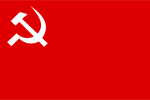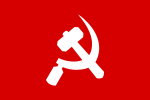- Communist Party of Nepal (Unified Marxist-Leninist)
-
For other uses, see Communist Party of Nepal (disambiguation).
Communist Party of Nepal (Unified Marxist-Leninist)
नेपाल कम्युनिष्ट पार्टी (एकिकृत मार्क्सवादी-लेनवादी)
Founded January 6, 1991 Headquarters Balkhu, Kathmandu, Nepal Youth wing Youth Association of Nepal Students wing All Nepal National Free Students Union Labour wing General Federation of Nepalese Trade Unions Ideology Communism,
Marxism-LeninismElection symbol Website http://www.cpnuml.org/ Politics of Nepal
Political parties
Elections Communist Party of Nepal UML building in Balkhu, Kathmandu, Nepal
Communist Party of Nepal UML building in Balkhu, Kathmandu, Nepal
The Communist Party of Nepal (Unified Marxist–Leninist), also known as CPN-UML, CPN(UML), is one of the largest communist parties in Nepal. It was created on January 6, 1991 through the unification of the Communist Party of Nepal (Marxist) and the Communist Party of Nepal (Marxist-Leninist). CPN (UML) was a product of the Jana Andolan (People's Movement) uprising where communists, together with the Nepali Congress, played a major role in the installment of a constitutional democracy in Nepal.
Contents
History
The fifth party congress (and the first one after the unification, the four first being of the original Communist Party of Nepal) was held in Kathmandu in January 1993. People's Multiparty Democracy was adopted as the party programme. Madan Bhandari was elected General Secretary and Man Mohan Adhikari was elected Chairman. Later the same year Bhandari died in a vehicle incident at Dashdhunga in Chitwan. After Bhandari's death, Madhav Kumar Nepal was elected General Secretary, and he remained in post until 2008.
In December 1994, CPN(UML) formed a minority government, which lasted nine months. Man Mohan Adhikari was elected Prime Minister and Madhav Kumar Nepal became Minister of Foreign Affairs. In 1997, CPN(UML) participated in a non-Nepali Congress government, with a faction of the Rashtriya Prajatantra Party and the Nepal Sadbhavana Party, and held the Deputy Prime Ministership.
In March 1998, CPN(UML) suffered a severe split over the Mahakali Treaty treaty with India. Those opposing the treaty broke away and formed Communist Party of Nepal (Marxist-Leninist) led by Bam Dev Gautam. The vertical split caused much harm to the party; in the 1999 parliamentary election, CPN(UML) merely got 31.61% of the votes whereas the rival faction only secured 5% of total votes.
On February 15, 2002, CPN(UML) and CPN(ML) were reunited. Following the merger, CPN(ML) leaders Sahana Pradhan, Bam Dev Gautam and Radha Krishna Mainali were nominated to the standing committee of CPN(UML). Siddhilal Singh, Ashok Rai, Trilochan Dhakal, Kiran Gurung, Gopal Sakya, Kamal Chaulagain, Rajendra Shrestha and Sitananda Raya were appointed full members of the central committee. Kamal Koirala, Hemraj Rai and Yogendra Shas were appointe alternative central committee members.[1][2]
The 7th general convention of CPN(UML) was held in Janakpur, February 1-February 6, 2003. The convention decided to abolish the post of party chair, a post vacant after the death of Manmohan Adhikari. Madhav Kumar Nepal was re-elected unopposed as General Secretary of the party. The convention elected a Central Committee consisting of Ashok Rai, Jhala Nath Khanal, Bharat Mohan Adhikari, Sahana Pradhan, Madhav Kumar Nepal, Subash Nemwang, Modnath Prashrit, Krishna Gopal Shrestha, Amrit Kumar Bohara, Pradeep Nepal, Bam Dev Gautam, Yuvraj Gyawali, Rajendra Pandey, Bidhya Devi Bhandari, Astha Laxmi Shakya, Keshab Prasad Badal, K.P. Sharma Oli, Shankhar Pokhrel, Radha Krishna Mainali, Pradeep Gyawali, Ishwor Pokhrel, Kashinath Adhikari, Bishnu Poudel, Siddhi Lal Singh, Mukund Neupane, Shanta Manavi, Surendra Pandey, Rajendra Shrestha, Kiran Gurung, Yuv Raj Karki and Raghu Pant, Suresh Karki, Bhim Rawal, Dhanendra Basnet, Hem Raj Rai, Bishnu Rimal, Trilochan Dhakal, Bhim Acharya, Kedar Neupane, Urbadutta Pant, Govinda Prasad Koirala, Gopal Shakya and Ramchandra Jha. 12 alternate members of the Central Committee were also elected: Chabbi Lal Biswokarma, Tul Bahadur Gurung, Urmila Aryal, Rakam Chemjong, Pashupati Chaulagain, Gokarna Bista, Prakash Jwala, Mahendra Pandey, Naresh Kharel, Ratneswore Goit, Puruswottam Poudel and Ramji Sharma.[3][4][5] When King Gyanendra in 2003 dissolved parliament and sacked Prime Minister Sher Bahadur Deuba, CPN(UML) took a leading part in the formation of the 5-parties protest movement. However, once Deuba had been reinstalled as Prime Minister, CPN(UML) joined the provisional government. This government was dissolved by Gyanendra in 19th Magh of the same year. In 2006, CPN (UML) was a major part of the Seven Party Alliance and the Loktantra Andolan.
Current membership
The 8th general convention of CPN(UML) was held in Butwal,February, 2009. The election elected Central office-bearers (elected by vote)
- Chairman: Jhala Nath Khanal
- Vice-chairs: Ashok Rai, Bam Dev Gautam and Bidhya Bhandari
- General Secretary: Ishwar Pokharel
- Secretaries: Bishnu Poudel, Shankar Pokharel and Yubaraj Gyawali
Central Committee Members
(Note: 85 will be elected as full members, 30 as alternate members. 52 of the total 115 members will be elected under reservation quotas.)[6]
Elected unopposed
Lalit Basnet (Quota/Laborer) – Full Chudamani Jangali (Quota/Laborer) – Alternate Urba Dutta Pant (Mahakali Zone) – Full Netra Panthi (Lumbini Zone) – Full
Elected by vote
Full members
- Naresh Kharel (Mechi Zone)
- Rajendra Gautam (Koshi Zone)
- Jaganath Khatiwada (Sagarmatha Zone)
- Keshav Prasad Devkota (Janakpur Zone)
- Devi Prasad Gyawali (Narayani Zone)
- Pashupati Chaulagain (Bagmati Zone)
- Yogesh Bhattarai (Kathmandu Valley)
- Ganesh Timilsina (Dhaulagiri Zone)
- Khagaraj Adhikari (Gandaki Zone)
- Prakash Jwala (Rapti Zone)
- Devraj Bhar (Bheri Zone)
- Dilli Bahadur Mahat (Karnali Zone)
- Bhanubhakta Joshi (Seti Zone)
- Jhillu Prasad Tiwari (India Diaspora)
- Agni Kharel (Central, Open Competition)
- Asta Laxmi Sakya (Central, Open Competition)
- Arun Nepal (Central, Open Competition)
- Urmila Aryal (Central, Open Competition)
- Kiran Gurung (Central, Open Competition)
- KP Sharma Oli (Central, Open Competition)
- Keshav Badal (Central, Open Competition)
- Krishna Gopal Shrestha (Central, Open Competition)
- Gokarna Bista (Central, Open Competition)
- Guru Baral (Central, Open Competition)
- Ghanshyam Bhushal (Central, Open Competition)
- Tul Bahadur Gurung (Central, Open Competition)
- Pradip Nepal (Central, Open Competition)
- Pradip Gyawali (Central, Open Competition)
- Prithivi Subba Gurung (Central, Open Competition)
- Beduram Bhusal (Central, Open Competition)
- Bishnu Rimal (Central, Open Competition)
- Dr Bijaya Kumar Poudel (Central, Open Competition)
- Binda Pandey (Central, Open Competition)
- Bharat Mohan Adhikari (Central, Open Competition)
- Bhanubhakta Dhakal (Central, Open Competition)
- Bhim Rawal (Central, Open Competition)
- Mahendra Pandey (Central, Open Competition)
- Madhav Kumar Nepal (Central, Open Competition)
- Mukunda Neupane (Central, Open Competition)
- Rakam Chemjong (Central, Open Competition)
- Raguji Pant (Central, Open Competition)
- Raghubir Mahaseth (Central, Open Competition)
- Rabindra Shrestha (Central, Open Competition)
- Rajendra Prasad Pandey (Central, Open Competition)
- Rajendra Prasad Shrestha (Central, Open Competition)
- Ram Chandra Jha (Central, Open Competition)
- Sahana Pradahan (Central, Open Competition)
- Surendra Prasad Pandey (Central, Open Competition)
- Kalyani Khadka (Quota/Women)
- Ganga Devi Dangi (Quota/Women)
- Gaura Prasai (Quota/Women)
- Jayanti Rai (Quota/Women)
- Tuka Hamal (Quota/)
- Thammaya Thapa Magar (Quota/Women)
- Radha Gyawali (Quota/Women)
- Srimaya Thakali (Quota/Women)
- Ganga Lal Tuladhar (Quota/Janajati)
- Dal Bahadur Rana (Quota/Janajati)
- Nagendra Chaudhary Tharu (Quota/Janajati)
- Parshu Ram Meghi Gurung (Quota/Janajati)
- Bijay Subba (Quota/Janajati)
- Binod Shrestha (Quota/Janajati)
- Bir Bahadur Lama (Quota/Janajati)
- Mahamood Alam (Quota/Muslim)
- Karna Bahadur Thapa (Quota/Marginalized)
- Dharmanath Prasad Sah (Quota/Madhesi Tarai)
- Dr Bamshidhar Mishra (Quota/Madhesi Tarai)
- Ram Chandra Yadav (Quota/Madhesi Tarai)
- Lalbabu Pandit (Quota/Madhesi Tarai)
- Satya Narayan Mandal (Quota/Madhesi Tarai)
- Chhavi Lal Bishwokarma (Quota/Dalit)
- Jitu Gautam (Quota/Dalit)
- Ramprit Paswan (Quota/Dalit)
Alternate members
- Thakur Gaire (Central, Open Competition)
- Ajambar Rai Kangbang (Quota/Janajati)
- Kamal Prakash Sunuwar (Quota/Janajati)
- Gokul Gharti Magar (Quota/Janajati)
- Jeevan Ram Shrestha (Quota/Janajati)
- Bisham Lal Adhikari (Quota/Janajati)
- Baijnath Choudhary Tharu (Quota/Janajati)
- Achyut Mainali (Central, Open Competition)
- Tuk Raj Sigdel (Central, Open Competition)
- Rameshwor Phuyal (Central, Open Competition)
- Kalpana Chapagain (Quota/Women)
- Kamala Subedi (Quota/Women)
- Garima Shah (Quota/Women)
- Gauri Oli (Quota/Women)
- Mamata Giri (Quota/Women)
- Mahin Limbu (Quota/Women)
- Sushila Nepal (Quota/Women)
- Dal Bahadur Sunar (Quota/Dalit)
- Kamala Devi Mahato (Quota/Madhesi Tarai)
- Ganga Prasad Yadav (Quota/Madhesi Tarai)
- Yog Narayan Yadav (Quota/Madhesi Tarai)
- Ram Chandra Sah Teli (Quota/Madhesi Tarai)
- Satrughna Mahato (Quota/Madhesi Tarai)
- Shri Prasad Sah (Quota/Madhesi Tarai)
- Najir Miya (Quota/Muslim)
- Gorakh Bahadur Bogati (Quota/Marginalized)
- Jagat Bishwakarma (Quota/Dalit)
- Bhagawat Bishwasi Nepali (Quota/Dalit)
- Rabindra Baitha (Quota/Dalit)
2008 Elections
CPN(UML) advocates a moderate leftist attitude. It played a major role in bringing Maoists to the negotiating table. However, the party has not been able to maintain a firm stance on issues, particularly during drafting the interim constitution, which showed a dual nature of the leadership. For the April 2008 Constituent Assembly election, the party rejected the proposal of electoral alliance with the Communist Party of Nepal (Maoist), citing its own popularity among people, and it decided to compete in all constituencies. It turned out to be a grave mistake, as the CPN(UML) failed to secure a single place out of 10 in the Kathmandu district, once considered to be its lal-killa (लाल किल्ला), or stronghold region. The biggest shock to the party was that General Secretary Madhav Kumar Nepal was defeated in an election by Jhakku Prasad Subedi of the CPN(M), who had been viewed as having very little popularity. Following his defeat, Madhav Kumar Nepal submitted his resignation from the post of General Secretary of the party, the post he held for 15 years. The CPN (UML) won a total of 103 seats in the election (out of 575 elected seats), placing third behind the CPN (M) and the Nepali Congress. The party left the government after the election, citing the "clear will of the people" expressed through the election as the reason.
2008-present
Following the resignation of M. K. Nepal, the post of General Secretary of the CPN (UML) was filled by Jhala Nath Khanal.
On February 2009, Jhala Nath Khanal has been elected to the Chairman of CPN (UML) by the eighth General Convention of the party organised in Butwal. Ishwar Pokhrel was elected to the General Secretary.[7]
In early May 2009 the UML joined several parties in leaving the Maoist-led coalition government in response to the sacking of Army Chief of Staff Rookmangud Katawal.[8] Following the resulting dissolution of the coalition, the UML now leads its successor.
On February 3, 2011, because of support by the UCPN Maoists, who are the largest force in Nepal's legislature today, Jhala Nath Khanal was elected Prime Minister of Nepal, securing a vote of 368 out of 601 in the Constituent Assembly.[9]
See also
Communism in NepalLeadersCurrent groupsDefunct groupsRelated articlesMass organizations
- General Federation of Nepalese Trade Unions (GEFONT)
- Youth Association of Nepal (YAN)
- All Nepal National Free Students Union (ANNFSU)
- All Nepal Women's Association (ANWA)
- All Nepal Peasants Association (ANPA)
- All India Nepalese Free Students Union (AINFSU)
- National Teachers Association
- National People's Cultural Forum
- Democratic National Organization of Person's with Disabilities-Nepal (DNOPD)
References
- ^ Nepalnews.com (newsflash) Arc332)
- ^ Nepalnews.com (newsflash) Arc329)
- ^ Nepalnews.com (newsflash) Arc594
- ^ Nepalnews.com (newsflash) Arc592
- ^ Nepalnews.com (newsflash) Arc590
- ^ http://www.myrepublica.com/portal/index.php?action=pages&page_id=9
- ^ http://www.nepalnews.com/archive/2009/feb/feb24/news16.php
- ^ http://news.bbc.co.uk/2/hi/south_asia/8031622.stm
- ^ http://www.pslweb.org/liberationnews/news/new-coalition-of-forces.html
External links
Categories:- Communist parties in Nepal
- Political parties established in 1991
Wikimedia Foundation. 2010.

